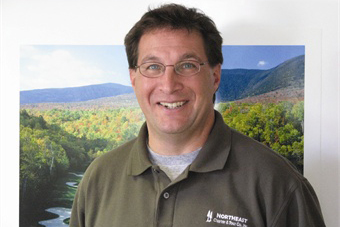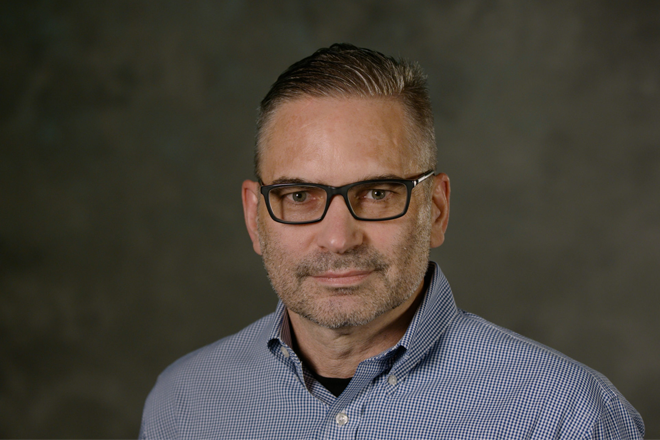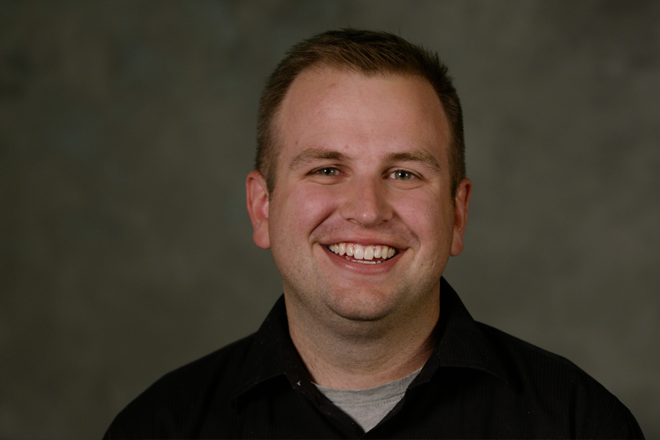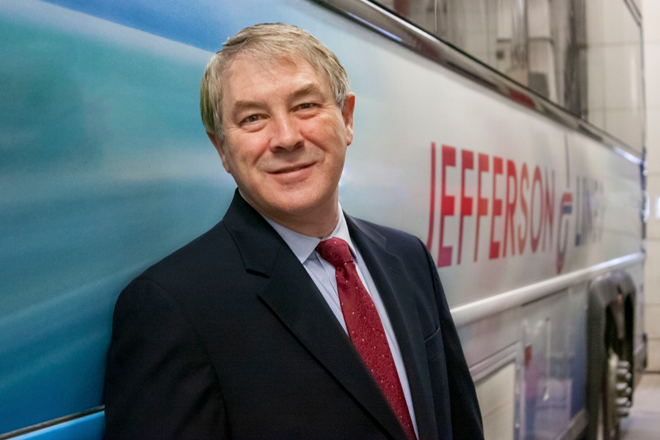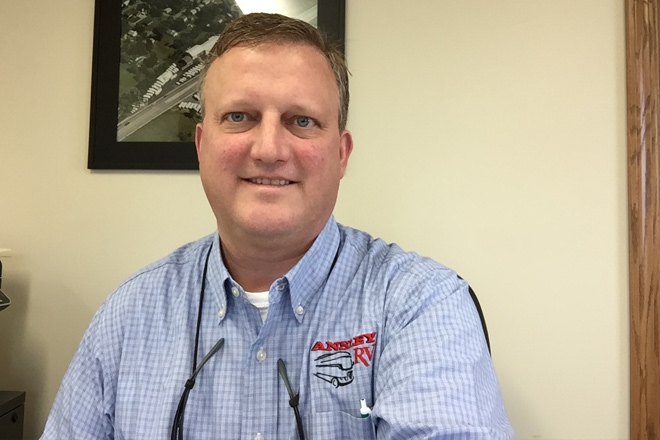Scott Riccio, CEO and president of Northeast Charter & Tour Company has been a Spader 20 Group member for just over three years. In January, he and his company will celebrate 15 years in business. His motorcoach organization based in Lewiston, Maine has turned heads in the industry with its quality of service, commitment to safety, and green initiatives.
Recently, Riccio and his crew were honored at the 2013 American Bus Association Marketplace as recipients of the Green Operator Award.
According to the ABA, Northeast Charter & Tour Company was, “selected by their peers after an extensive review process of their daily motorcoach operations, which included the company’s commitment to environmentally friendly ways to drive, the use of anti-idling techniques when the motorcoach is not in use, the safest and greenest ways to recycle oil and other engine fluids, and overall business practices that promote environmental protection and awareness.”
Riccio attributes a healthier business to a newfound sense of objectivity, appreciation for numbers, and out-of-the-box thinking nurtured in Spader 20 Groups. Here is his story.
How did you come to own your business?
Scott Riccio: I worked for a large charter bus company for 15 years here in Maine. They got bought out, and I decided it wasn’t for me; I decided to get out of the bus business. About a month later, I got a phone call from an old customer from my original company saying, “We can’t stand they way they do things,” “They don’t understand us,” and “Why don’t you get in the bus business and we’ll support you financially with what you need for equipment?”
I had just gotten out of the bus business, so I had some real hesitations to go back into the bus business. At the same time, I was flattered by my old customers. This gentleman conference called two to three other old customers – summer camps throughout the state of Maine – and that’s really how it got started.
I had already owned a van where I was transporting passengers to and from Boston Logan airport into Maine to go skiing. With the financial support of my old customers, I was able to buy equipment and lease equipment. I got started with one bus and one mini-bus. There were many days I needed much more equipment than that, but I would subcontract and broker through other companies in the state of Maine. I was basically a brokering agent running a small business. When I needed the busses for the day I would hire them through other companies.
And eventually you evolved into this full service industry?
SR: It was a great beginning. I leased a bus from a friend of mine in New Jersey until I could get going and build some cash and buy my own [business]. The business slowly took off. Unfortunately, I ran into 9/11 not too long after first starting, which gave us some setbacks. We were able to keep going forward and watch the business grow.
It grew well, then it got smaller, and now it’s really come back to be the biggest it’s ever been, especially with the school bus divisions that we’ve taken on.
In that story, when did you know you needed outside help from an organization like Spader?
SR: [It was] when I was too big and things were not going well. A lot of bus operators are born through working for another bus company, and I’m a prime example of, “I think I know what I’m doing, but in reality, I don’t know exactly all I need to know in order to run a business,” whether it’s a charter bus company, or any type of business. Thinking that you work for that type of business is a great background, but there are a lot of us that are part of that breed in this industry. You think you know everything there is to know, and you really don’t know anything. What you know is not anywhere near as valuable as what you need to know about numbers.
There are a lot of people who run their business – [myself] included, when I first got started – who weren’t necessarily looking at their books and numbers and deciding if an idea was feasible or not feasible. Budget was a word I never used six years ago. It wasn’t part of my vocabulary. This was one of the reasons my business wasn’t doing so well and got smaller to the point where I was frustrated – was this what I want to do? It was a lot of work. No return on investment. I was working hard for nothing. It was a waste of time. There was no reward at the end of the game. No profit.
I really was to the point where I just needed help.
I knew [Spader] was a good thing for me. Looking into Spader, I knew it was valuable. I also knew it would be nerve-wracking, because we were going into the un-chartered waters. That’s a little scary.
I knew sales, marketing and operations – that was my specialty. Accounting – that wasn’t my specialty. So I’m going in to learn a lot about numbers and it’s a little nerve-racking. [At Spader], you’re going to learn the good, bad and indifferent. But knowing you need to learn the good, bad and indifferent and taking constructive criticisms, because it’s going to better your business in the long-run, [is important]. This was exactly what my business was lacking. I knew I had to do it.
Can you pinpoint one key lesson you’ve learned from being involved with 20 Group?
SR: I think I’ve become more objective with my decisions moving forward as a company. I’ve got a lot of key players in how I run my business. Key players will come to me with ideas and I’ll certainly listen to their ideas. But I’m going to dig into, from a financial perspective, whether it’s within the budget or not. I’m going to look at that. I would never look at things that in-depth in the past.
I’ve learned to be better at understanding finances than I ever used to be because of Spader. My company is healthier – and when I say healthier, I mean more profitable – because of that. I think when you have a healthier company and a more profitable company, one: I can relax more, because at the end of the day, it’s all my responsibility. And two: I can do more for my employees, because there’s more money in the bank.
A couple of years ago we started doing bonuses. A year-and-a-half ago we started doing raises and driver incentives. We’re giving back to the people who make it happen out on the road and within the office. Spader has taught me how to make better decisions. Spader has given me opportunities to call my friends in California or Ohio or Phoenix and say, “How would you do this?” or “What do you do over there?” [I can call] somebody in an area – Mississippi – where maybe business is different but ask, “How do you run this program?” or “What do you think about that?”
You’ve got competitors who are friendly, but they aren’t telling you the truth, so why bother to have that conversation? You’re a competitor. With Spader, you can have that hard conversation about “I’m losing my shirt on this, or I’m losing my shirt on that.” Well, go for it.
[Spader] has given me opportunities to make better decisions. People try to make us feel guilty about why our price is where it is. I’ve got a guy that’s complaining now that our price is too high. He wants a new company, because he’s frustrated with the company he’s using because they’re terrible. He wants me to match their price – it’s not going to happen. Spader has taught me to be diligent. I’ve been able to teach my sales staff to be diligent. We sell our product. We sell the value-added service of who we are.
You’re ticked off at your current carrier, yet you want me to match his price? I don’t know what to tell you. I’m only $600 more for the multi-day trip, that’s like four dollars [per] kid. That’s not a lot of money. I said to the sales guy “What’s the answer?” and he said, “Well, I’m going to tell him this is our price.” Good. That’s the answer. I do that trip for him and I’m losing money if I’m taking the $600 dollars out. I’m not making him happy, but I’m not making me happy.
Spader has taught me to be more objective. Through meetings with staff, I’ve been able to pass along how they can be objective to run the business more efficiently.
What’s the most challenging part of running a business in the motorcoach industry?
SR: The most challenging, I think, is the logistics from start to finish – making sure the busses are cleaned, maintained properly, and the drivers know where they’re going and what they’re doing. There’s lot of crossing t’s and dotting i’s on a regular basis, whether it’s through dispatch or sales or wherever. “Who’s on call? Who’s covered this? How do we handle that?” – that can be a challenge. It’s a challenge that I’m comfortable with.
If you’re going to be in this business, you have to be prepared to be able to think out of the box morning, noon, and night. It’s a challenge to make sure that the left side of the garage knows what the right side of the garage knows. Or that dispatch understands with sales.
Until Spader, we would never do meetings. We might sit down and have a conversation once in a blue moon or talk in the hallway but now we actually have maintenance meetings, or sales meetings, or we have management meetings. We sit in the conference room and talk. We spend whatever it takes to get everybody on the same page.
If dispatch understands some of the frustrations maintenance is dealing with, then everybody’s on the same page because dispatch is trying to put the equipment out there. Sales is trying to sell it, dispatch is trying to move it, and maintenance wants to keep it, because it needs work. It’s a logistical, “Does everybody know what’s going on?”
Every time you do something irregular, you waste money. If you run to town twice when you really could have been more orchestrated and ran to town once, you save money. When you save money, you make more money. So now, teach people to think that way – outside of the box, and get them together and talk as a group.
Spader has challenged me in a multitude of ways, which was exactly what I knew I needed, which was exactly what I knew I would hate. But I knew it was good for me and it was good for my business, so I did it. And I’m benefiting from that.
Anything you’d like to add?
SR: Spader’s an investment. Unfortunately I just missed my July meeting, but I had to because we had a school board vote that we had to be a part of, which was actually a good thing, because we landed a huge contract for it. It was tough for me to miss my Spader meeting. I like being there. I look forward to it, I thrive on it. I come back rejuvenated with ideas. I talk to people [who] I haven’t seen in awhile. Jim’s a great leader and teaches us and challenges us in so many ways.
It’s garbage in, garbage out. When you go to Spader, you’re not allowed to bring garbage, you have to bring good stuff. And hopefully you bring those good things back to your business and it benefits. I’m definitely a product of that because of Spader. No question.

